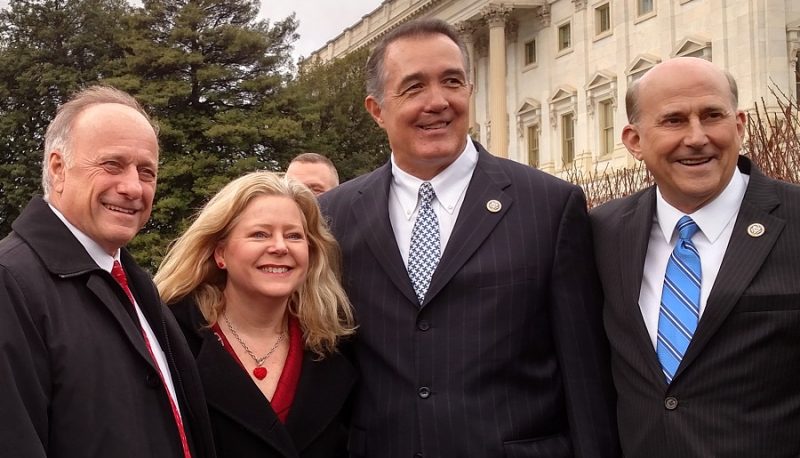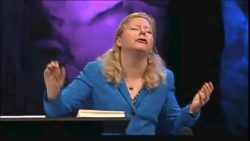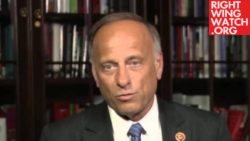On Wednesday, a House subcommittee chaired by Rep. Steve King of Iowa will hold a hearing on a bill that King has sponsored that could ban abortion as early as six weeks into pregnancy—that is, before many women even know that they are pregnant.
The bill, the Heartbeat Protection Act of 2017, is based on legislation that Ohio activist Janet Porter has been pushing on the state level for years. The federal version of Porter’s bill would ban abortion after a “detectable heartbeat” is found in the fetus, which can happen as early as six weeks into a pregnancy; it allows for an exception only when the pregnant woman’s life is endangered by “physical” causes. Porter has openly stated that she hopes that as “technology improves” fetal heartbeats will be detected earlier and earlier so eventually her bill will ban abortion “before the mother even knows that she’s pregnant.” She has boasted that her bill is “the foot in the door” to outlaw all abortion. She recently presented her proposal to Vice President Mike Pence at the White House.
“Heartbeat bills” are clearly unconstitutional: Similar bans in Arkansas and North Dakota have been thrown out by the courts, and one passed by the legislature in Porter’s own state of Ohio was vetoed by Gov. John Kasich last year.
But that hasn’t stopped King from moving forward with his bill in his House Judiciary subcommittee on the Constitution and Civil Justice, which just happens to also include two of his fellow “heartbeat bill” boosters, Rep. Trent Franks of Arizona and Rep. Louie Gohmert of Texas, along with newly elected Rep. Karen Handel of Georgia, who has a history as an antagonist of Planned Parenthood.
King’s subcommittee has released a list of witnesses it will call for the hearing. Perhaps wisely on King’s part, the list does not include Porter, who comes with the baggage of promoting off-the-wall conspiracy theories and extreme hostility to LGBT rights. Instead, the committee has called abortion rights opponents Star Parker, Kathi Aultman and David Forte, along with reproductive rights supporter Priscilla Smith of the Reproductive Rights and Justice Project.
Parker is a fixture at Religious Right events, where she rails against abortion rights and LGBTQ equality along with government safety net programs, once saying that the country’s major problems all stem from “sexual promiscuity.” She has called legal abortion “genocide” of “Holocaust levels” and has warned that God will judge America for legal abortion and marriage equality. Parker has told gay people to “keep it private” and blamed them for bringing “hostility into the public square.” At a conference last year, Parker urged young, anti-choice women to go to law school “so they can make you a judge and you can get on these courts” and reject laws that are “unlawful in God’s eyes.” She once accused President Obama of “verbal rape” because a speech he gave at a prayer breakfast included too much “secular humanism.”
Aultman is a former abortion provider who has since rejected abortion rights and now serves as an associate scholar with the Charlotte Lozier Institute, the research arm of the anti-choice organization Susan B. Anthony List. Curiously, the committee lists Aultman as a fellow with the American College of Obstetricians and Gynecologists, a professional association that supports abortion rights.
Forte is a law professor in Cleveland who helped draft state versions of the “heartbeat bill.” Forte has defended “heartbeat” bills against criticism from fellow anti-choice activists who worry that they are too extreme to stand a chance in the courts, saying that “Courts never change their minds unless they are invited to.” In contrast to Porter’s admission that the bill is aimed at eventually banning all abortion, Forte has written that the bill “does not confront the Court with an all or nothing choice” because it is “not a flat ban on abortion.”






